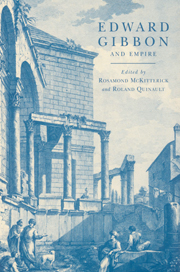Book contents
- Frontmatter
- Contents
- List of contributors
- Preface
- List of abbreviations
- Introduction
- 1 Gibbon and the later Roman Empire: causes and circumstances
- 2 Gibbon and Justinian
- 3 Gibbon and the middle period of the Byzantine Empire
- 4 Byzantine soldiers, missionaries and diplomacy under Gibbon's eyes
- 5 Gibbon and the later Byzantine Empires
- 6 Gibbon and the Merovingians
- 7 Gibbon, Hodgkin, and the invaders of Italy
- 8 Gibbon and the early Middle Ages in eighteenth-century Europe
- 9 Gibbon and the ‘Watchmen of the Holy City’: revision and religion in the Decline and fall
- 10 Gibbon and international relations
- 11 Gibbon's Roman Empire as a universal monarchy: the Decline and fall and the imperial idea in early modern Europe
- 12 The conception of Gibbon's History
- 13 Winston Churchill and Gibbon
- Epilogue
- Index
11 - Gibbon's Roman Empire as a universal monarchy: the Decline and fall and the imperial idea in early modern Europe
Published online by Cambridge University Press: 02 December 2009
- Frontmatter
- Contents
- List of contributors
- Preface
- List of abbreviations
- Introduction
- 1 Gibbon and the later Roman Empire: causes and circumstances
- 2 Gibbon and Justinian
- 3 Gibbon and the middle period of the Byzantine Empire
- 4 Byzantine soldiers, missionaries and diplomacy under Gibbon's eyes
- 5 Gibbon and the later Byzantine Empires
- 6 Gibbon and the Merovingians
- 7 Gibbon, Hodgkin, and the invaders of Italy
- 8 Gibbon and the early Middle Ages in eighteenth-century Europe
- 9 Gibbon and the ‘Watchmen of the Holy City’: revision and religion in the Decline and fall
- 10 Gibbon and international relations
- 11 Gibbon's Roman Empire as a universal monarchy: the Decline and fall and the imperial idea in early modern Europe
- 12 The conception of Gibbon's History
- 13 Winston Churchill and Gibbon
- Epilogue
- Index
Summary
It is not often emphasized how hostile Gibbon was to his great subject, the Empire of Rome. Yet his view of empires, stated in the opening sentence of the Essai sur l'étude de la littérature, was unequivocal: ‘l'histoire des empires est celle de la misère des hommes’. Rome horrified even as it fascinated him. As he wrote to his father on his arrival in the city in October 1764, with a spontaneity missing from the artfully crafted recollections in the Memoirs: ‘whatever ideas books may have given us of the greatness of that people, their accounts of the most flourishing state of Rome fall infinitely short of the picture of its ruins. I am convinced that there never existed such a nation and I hope for the happiness of mankind that there never will again.’ Drawing attention to this passage, Arnaldo Momigliano observed that it revealed a Gibbon who was never the slave of his classicism, and whose history would become the story of how humanity had ‘turned its back on Rome’.
Gibbon's choice of the Roman Empire as his subject has received a number of persuasive explanations, none of which, it seems to me, has quite taken the measure of this hostility. Though the first to recognize that his choice required explanation, Gibbon's own attempt to provide one in the Memoirs was understandably mellow, a lineal account of personal intellectual development which left little scope for the reconstruction of the wider settings in which his work gained its purpose and originality.
- Type
- Chapter
- Information
- Edward Gibbon and Empire , pp. 247 - 270Publisher: Cambridge University PressPrint publication year: 1996



